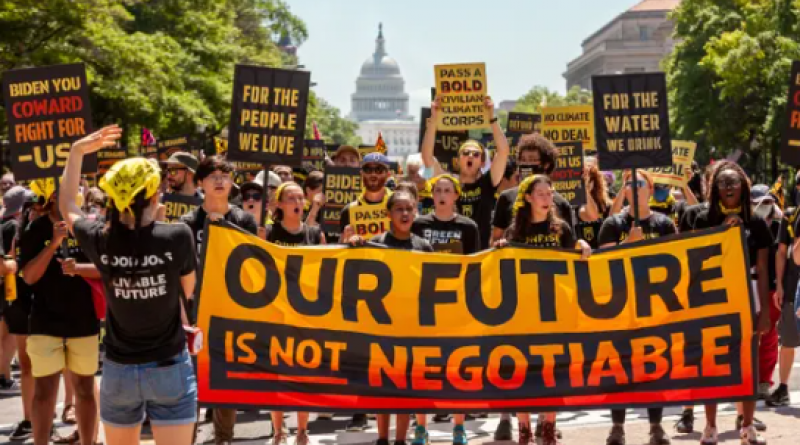‘No point in anything else’: Gen Z members flock to climate careers

Colleges offer support as young people aim to devote their lives to battling the crisis.
California is facing a drought so devastating, some publications call it “biblical”. Colorado now has “fire years” instead of “fire seasons”. Miami, which sees more dramatic hurricanes each year, is contemplating building a huge seawall in one of the city’s most scenic tourist districts to protect it from storm surges.
“Once you learn how damaged the world’s ecosystems are, it’s not really something you can unsee,” says Rachel Larrivee, 23, a sustainability consultant based in Boston. “To me, there’s no point in pursuing a career – or life for that matter – in any other area.”
Larrivee is one of countless members of Gen Z, a generation that roughly encompasses young people under 25, who are responding to the planet’s rapidly changing climate by committing their lives to finding a solution. Survey after survey shows young people are not just incorporating new climate-conscious behaviors into their day-to-day lives – they’re in it for the long haul. College administrators say surging numbers of students are pursuing environmental-related degrees and careers that were once considered irresponsible, romantic flights of fancy compared to more “stable” paths like business, medicine, or law.
“I cannot imagine a career that isn’t connected to even just being a small part of a solution,” says Mimi Ausland, 25, the founder of Free the Ocean, a company that aims to leverage small actions to remove plastic from the ocean.
Democrats in Washington hope to channel this energy through the proposed Civilian Climate Corps, a federal jobs program for young people to help fight the climate crisis and conserve public lands. While funding for the New Deal-inspired program is tied up in budget negotiations on Capitol Hill, youth activists say they hope it would help kids fresh out of high school land environmental-related jobs.
“The Civilian Climate Corps would actually allow a lot of young people to have a direct pipeline to these careers,” says Matt Ellis-Ramirez, 22, a Chicago-based volunteer for the youth-led environmental activist organization the Sunrise Movement.
Young people are finding their way to these careers, though, with or without the federal government’s support. Brooke Hoese, a 24-year-old undergraduate in Texas pursuing a career in restoration ecology, is taking an interdisciplinary approach. They spent the summer working on a farm that practices regenerative agriculture, a method to restore soil biodiversity, to contribute toward an integrative studies degree involving ecology, literature, and philosophy.
“My goal is to use the lens of literature and philosophy to study and hopefully help repair humans’ relationship to our environments,” they say.
College campuses across the country are now finding new ways to help students like Hoese integrate climate studies across various disciplines. The University of Southern California in Los Angeles, for example, launched the Sustainability Across the Curriculum program earlier this year to teach the college’s 20,000 undergraduate students how their majors intersect with sustainability and the environment.
A 2020 USC survey found that 64% of undergraduate students are “very interested” in on-campus sustainability, while 27% are “interested”. They’re also practicing what they preach: 33% of survey respondents say they participate in sustainability activities “daily” and 27% report weekly sustainability practices.
“In the past, interest in the environment and sustainability was probably more of a niche interest, whereas now I see students that are studying in many different fields across campus also have an interest in sustainability,” says Jill Sohm, the director of the Environmental Studies program at USC. She says there’s been an uptick in student enrollment within her department, particularly over the last five to 10 years.
Christopher Schlottmann, the global curriculum coordinator at New York University’s environmental studies program, reports similar growth. And while the job market is rough across the board for new grads, Schlottmann says having some form of environmental degree under their belt is an asset, not a hindrance.
“There’s a general reputation that if you do good for the world, nobody’s going to pay you to do it. I don’t think that’s that accurate,” he adds. “If you understand how climate change works, then a bank should actually really want to talk to you because they want to hedge their risk.”
The United States Bureau of Labor Statistics projects that employment opportunities for environmental scientists and “related specialists” will grow 8% over the next 10 years, a rate much faster than growth in other industries. And pay ranges notably above overall median income levels: the 2020 median pay for environmental scientists is $73,230 per year, while environmental lawyers earn a median yearly salary of $122,960. Urban farmers, a career path that doesn’t require a bachelor’s degree, make roughly $71,160 a year.

“We grow up being told that working in environmental fields is a dream that is not accomplishable. And there’s no money in it,” says Ellis-Ramirez. “But as we start to realize that the world that we live in isn’t sustainable, and that corporations will stop making money if we lose the planet, then that funding is going to start showing up.”
Other young people note that a variety of industries now incorporate environmental issues into their work, giving young professionals flexibility to pursue a variety of career paths. “Things like sustainability aren’t fringe – they’re really mainstream,” says Joel Hartter, the director of the new outdoor recreation economy graduate program at the University of Colorado, Boulder. “I think that translates into people seeing that they have career options.”
As attention to the environment grows, so too does Gen Z’s awareness of how the climate crisis and pollution disproportionately harm marginalized communities.
“Environmental issues are not just environmental issues, but rather one avenue to help address other issues in society,” says Brooke Majewski, 23, a recent college graduate who works at a company that helps businesses achieve their sustainability goals. “It is about finding solutions for the planet we are on, but it is also finding solutions for the people being most negatively impacted by climate change.”
Surveys indicate that shifting attitudes toward the crisis often fall along generational lines. A 2021 Pew Research report found that Gen Z is overwhelmingly worried about climate change: 76% of them say that it’s one of their biggest societal concerns, while 37% make it their number one concern.
According to Pew, 32% of Gen Z respondents have participated in at least one major environmental action of the course of the past year, such as donating, volunteering, attending a rally, or contacting an elected official. In contrast, 23% of Gen X and 21% of baby boomers reported participating in such an action during the past year.
“I decided to pursue this industry because I think I’m in the first generation who knows the extent to which climate change poses an existential threat to life on Earth, and also the last generation who may be able to do anything about it,” says Larrivee, the Boston-based environmental consultant.
Solutions to the planet’s grim environmental future are in reach thanks in large part to this army of young people flooding universities, job fairs, and interview rooms with clear-eyed confidence in science, policy, and each other. This enthusiasm is historically unprecedented, says Schlottman.
“This is not a preset problem with a preset solution,” he says. But “their hearts are in the right place, and their minds are really close to in the right place too”.
6 September 2021
The Guardian




